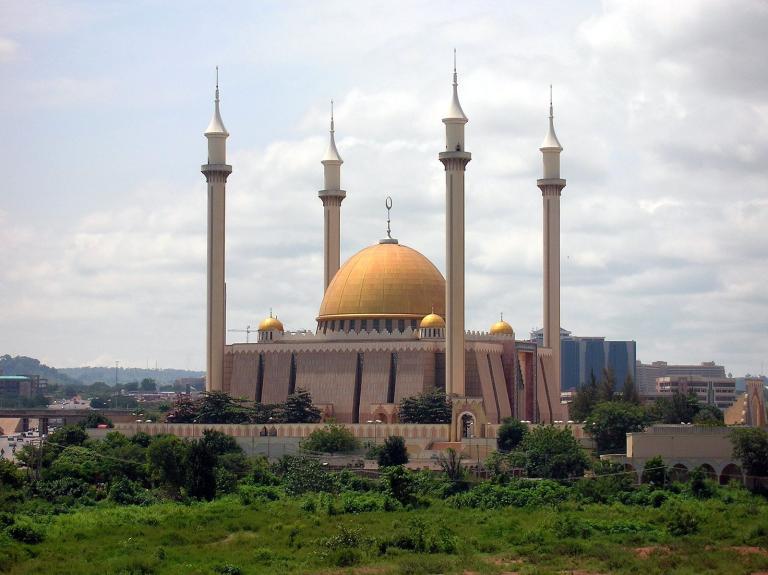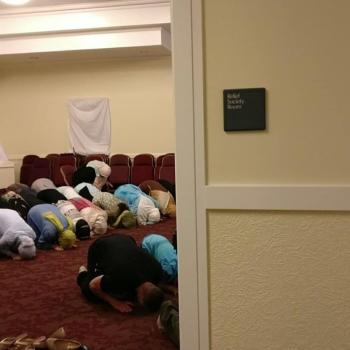
(Wikimedia Commons public domain)
More from The Manuscript:
The struggle that today’s Muslims have with the massive fact of the West is well illustrated in contemporary Arabic and other Near Eastern literatures. Several issues constantly appear: How is Western scientific rationalism to be balanced against faith? This is the old issue, faced also in the West itself, of reason versus revelation, of faith versus science. And how are traditional ways to be balanced against innovations? What about dress? What about economic progress? How far should it be allowed to damage the real values of the people? Their uncertainty is well illustrated in the title of a book published in 1964 by the well-known Arab thinker Muhammad Qutb: Are We Still Muslims? it asked.[1]
Do any of these struggles sound familiar? I have argued that we in the West have much to learn in observing these issues and how they are dealt with by Muslims because these are our issues as well. The advantage is that they are more clearly drawn, more starkly apparent, in the Near East. When we are making compromises, we are often not even aware that we are doing so because both our religion and our science, our religious values and the secular values that often threaten them, are clothed in the same language. Things are clearer, in some ways, for the Muslim. The ideas that threaten his traditional values often come clothed in a foreign accent. Ours come in clothes like our own, speaking in a familiar tongue.
I do not want to give the impression that Islam is faltering across the board. This would be completely, and even dramatically, untrue. Several million Muslims now live in North America, making Islam a larger religion in our own society than several of the religious denominations that we still call “mainstream.” And Islam is spreading rapidly here. It is also growing spectacularly in Africa. There, I suspect, it may serve the same role that it served for the hanifs in early Arabia: It allows people to choose a religion that is not politically involved with any perceived oppressor. To choose Christianity or even secular consumerism is to align oneself with the West, just as to choose communism was to align oneself with what was once considered the other superpower. But Islam is a religion that, for some reason, comes free of the taint of imperialism or aggression. Why this should be so is not precisely clear. After all, the early Arab conquests, though not unusual by ancient standards, were clearly imperialistic by today’s standard. And although Islam’s record on racial matters is considerably better than Christianity’s, Arab Muslims were centrally involved in the African slave trade until surprisingly recent times.[2] Nevertheless, many blacks in the United States—athletes like Muhammad Ali (Cassius Clay) and Kareem Abdul Jabbar (Lew Alcindor)—have opted to reject their “slave-names” and the “slave religion” that went with them, Christianity, and to adopt Islam and Arabic names instead.
Lamin Sanneh, then of Harvard Divinity School, visited Brigham Young University many years ago for a conference on religion in Africa. Prof. Sanneh, a West African Christian who had received an Islamic education, had much to say about the relations between Islam and Christianity in Africa.[3] One of his insights in particular stood out, and I have continued to reflect upon it ever since: Christians, he observed, go out of their way to translate the Bible into every language they can. And when they take its message, they make every effort to strip it of nonessentials. “You do not need to wear Western clothing to be a Christian,” they point out. “Nor do you need to adopt a Western lifestyle or favor Western politics.” They try to fit Christianity into the local culture with the least possible disruption, hoping to minimize the obstacles that will always be there to hinder people from accepting Christ. And these efforts have been very successful. Christianity is growing quite rapidly in parts of Africa, for instance. But Muslims’ efforts to spread their religion have tended to be quite different. If you want to read the Islamic scripture, they say, you should preferably do it in Arabic. You should pray in Arabic. You should probably adopt an Arabic name. Perhaps, in some areas, you should even begin to dress like an Arab. Islam, in other words, makes little or no effort to fit into the local culture. And Islam is growing more rapidly in Africa than Christianity.
[1] His brother, Sayyid Qutb, is even more famous (or notorious).
[2] See, on this question, Bernard Lewis’s Race and Slavery in the Middle East: An Historical Inquiry (New York: Oxford University Press, 1990).
[3] A version of Prof. Sanneh’s presentation has been published as Lamin Sanneh, “Translatability in Islam and in Christianity in Africa: A Thematic Approach,” in Religion in Africa: Experience and Expression, edited by Thomas D. Blakely, Walter E. A. van Beek, and Dennis L. Thomson (London: James Currey, and Portsmouth, New Hampshire: Heinemann, 1994), 23-45.












